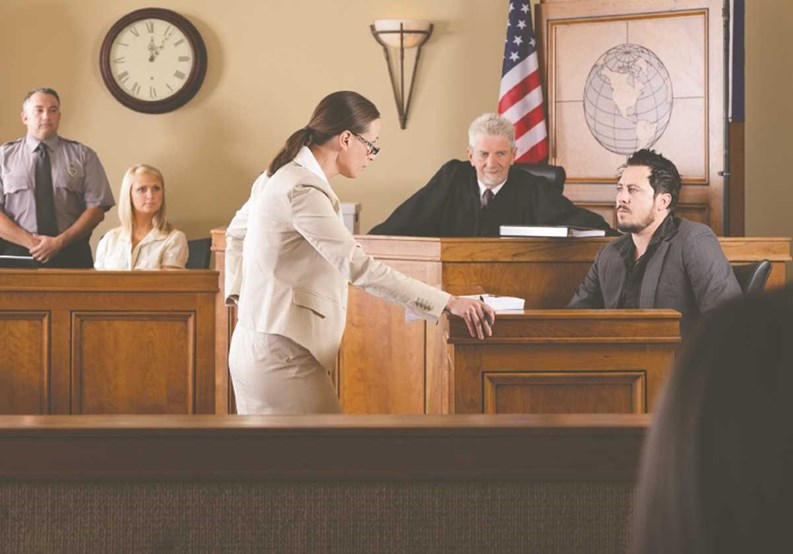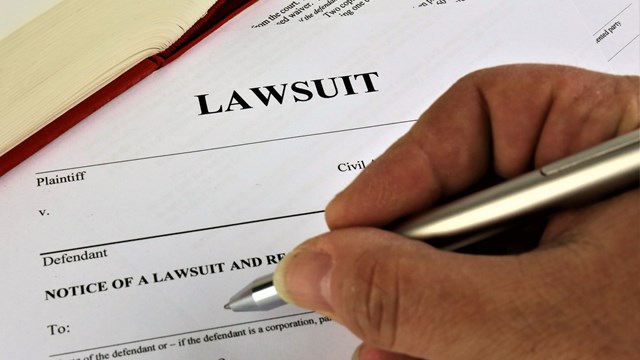You may think it’ll never happen to you. You're the nicest person around. You love your neighbors, and have never quarreled with the board of your condo community over anything. This is all great—but unfortunately, it doesn't amount to much when legal issues flare up. Accusations fly. Feelings are hurt. Lawyers get involved. And the whole thing goes downhill from there.
In the context of a co-op or condo community, legal issues can surface for any reason—between a resident and the board, between two or more residents, or between a group of residents and the board or management, just to name a few of the more common permutations. Knowing the best practices to use when a lawsuit hits your association is key in getting through it and moving on from the experience.
Follow Suit
The past few years have seen an increase in the number of complaints filed with the Illinois Department of Human Rights and the City of Chicago Commission on Human Rights, which handles fair housing, discrimination, inaccessibility and other related actions. Kelly Elmore, a principal with the Buffalo Grove-based law firm of Kovitz Shifrin Nesbit, attributes the rise to bad economic times. “The trend we see is that when people don’t have money, they tend to sue more. They’re disgruntled, and looking for a way to make a quick buck.”
Whether you’re an association or individual, Elmore advises the first thing you should do immediately upon learning that you're being sued is contact your attorney so he or she can “file an appearance.” This indicates to the court and the parties involved that you have legal representation, and includes all the associated contact information for subsequent communication between parties.
For an association being sued by an individual, another reason to involve an attorney right away is because as a not-for-profit corporation, a condo association can’t represent itself, Elmore explains. She notes that there has been debate in the legal community about changing this stipulation depending on the size of the building—“It applies to a four-unit building the same as a 400-unit building”—but for now, it applies to everyone.
A third important reason for notifying attorneys ASAP is to find out if the issue at hand is covered by your insurance. “If so, get it to your agent or carrier to see what kind of coverage you might have,” says Patrick T. Costello, a shareholder with the Chicago-based law firm of Keay & Costello, P.C. You don’t want to wait so long to notify your insurance carrier that it becomes too late to recover appropriate losses. A building that contracts with a property manager should also make a copy of the lawsuit documents to forward to that manager.
If you're an individual being sued by a condo or co-op, a first step may be to speak with the association’s attorney and see if there’s some way to work out the problem without continuing through with pricey litigation. Beyond that, it’s still valuable for an individual to hire legal counsel. “A unit owner can certainly represent him- or herself, but I’d still recommend getting a lawyer,” Elmore says, adding that if money is an issue, individuals can always look for free legal aid groups.
What Not to Do
Perhaps the number-one rule when it comes to lawsuits: Don’t ignore them. Unlike a minor head cold, a lawsuit is not likely to improve with time. Second rule: keep your mouth shut. “Don’t send a letter saying, ‘Sorry I did these things, but I don’t have the money to pay,’” Costello explains. You might think you’re being neighborly, or trying to accept responsibility hoping that will help, but it could backfire as an admission of guilt and ultimate liability. “Unfortunately, the phrase ‘I’m sorry’ takes on a lot of different connotations,” Costello says.
Along similar lines, don’t immediately send a check and consider the matter settled, even if the amount involved is small. “Make sure you get a release,” Costello says. “The release means that one party is willing to accept some amount or type of agreement and agrees to not sue again.”
When a lawsuit is progressing, it’s crucial to cooperate honestly and fully with your attorney. “If you don’t provide all the information, it’s very difficult [for your counsel] to make an assessment,” Elmore says. “Don’t think that hiding something from your attorney means it’s going to be hidden forever. Share it and ask for their help in mitigating its effects.”
Money Well Spent
It may seem like attorney fees are over-the-top, but when you find the right lawyer, they work for every penny they earn. “My job isn’t to give a person what they want,” explains Sima L. Kirsch, owner of the Chicago-based Law Offices of Sima L. Kirsch, PC, “but to hear the underlying situation, break it down, see if there’s something in the situation that can be done, see where to go from there and then to give an opinion on what the options are.”
As a suit progresses, an attorney can play a few different roles. “At bare minimum, an attorney will provide advice on how to respond,” Costello says. The attorney will be in communication as to the status of the litigation and offer recommendations on how to proceed. As a board, be sure that communication about pending litigation is discussed in executive sessions. Non-board unit owners have a right to know some information, but names should be withheld, and legal strategy should definitely be kept between attorney and client. Outside of the executive sessions, Costello says, “I always recommend not to talk about what your lawyer’s impression is; just the facts, just what’s on public record.”
Alternative Options
There are preemptive measures and alternatives to defusing a lawsuit before it gets out of hand. “It’s not hard to control any of these issues if both sides act properly,” Kirsch explains. “It comes down to good board governance, training each new board, and informational meetings so the board and ownership understand their rights that come between them.”
Kirsch is on a committee of the Association of Condominium, Townhouse and Homeowners Associations (ACTHA) that is putting a bill together to stipulate an ombudsman position in Illinois that would help educate boards before small matters get into lawsuit territory. “It all comes down to training and education,” Kirsch says.
Basically, the board has to act in strict adherence to its own declaration. “When it doesn’t, it doesn’t have authority,” Kirsch explains. That’s when a lawsuit begins to fall apart. A board can increase fines for damage caused by a dog, but if it does so at a meeting without calling a hearing, without informing the person with the dog, without showing evidence of the dog causing the damage, then there’s a breakdown of legal standing.
When a case does have legal merit, it’s a helpful exercise to look down the line with your attorney and see what you’re trying to accomplish and what the end result may be. “Do we get X in four years, or do we end now and get Y?” Kirsch says. No matter what the outcome, Kirsch reminds boards and residents that they still need to live together. She also points out that there are some attorneys who have their own bottom line in sight, rather than their client’s. An attorney who has dollar signs in their eyes may want to prolong a case despite an acceptable outcome that would cost less. So be sure to keep your own goals and budget in mind.
Legal Gadflies
We all know the types. The hair-trigger litigious types who think the world is out to get them. If one happens to live in your building, the best advice, Kirsch says, is to “Make sure the board is acting absolutely perfectly.” Meaning: The board must act by the book, to the letter of the law. Besides protecting the association so that it is legally, financially and structurally safe, it also makes practical sense. Kirsch compares a co-op or condo living situation to a family. “You have rules, you have boundaries, you keep everyone in control.” When the boundaries are blurred, things can get more difficult. “The biggest mistake associations make is that everyone wants to be friendly and loosey-goosey, and the first problem comes up and then it’s too late.” Which only makes it harder to fight a suit-happy owner or, ultimately, have their contract terminated.
Because of something called a “slap statute,” it’s actually very difficult for an association to get an excessively litigious homeowner evicted. “It says, if someone is participating in government—filing a lawsuit or complaining to an alderman—you cannot sue them because of their participation in government,” Elmore explains. Exceptions arise if a board can claim malicious prosecution. “If you can clearly demonstrate that the other party had no conceivable way of winning, and the person made the claim to harass the other party, and you have a fact pattern to prove this, then you can claim malicious prosecution,” she explains.
Costs – Monetary and Otherwise
Before diving into a lawsuit, consider the cost and whether the result you’re looking for is worth it. Kirsch says a ballpark hourly rate for a good lawyer is $250 to $350. Simply reading through initial documents could take several hours before even coming up with a legal strategy—never mind going onto court. Legal fees may or may not be included in a settlement. Sometimes the matter of who pays legal fees is up to the court or depends on the association declaration.
Plus, Elmore points out that a sheriff has to be paid to actually serve the complaint. “That could be expensive—especially if you’re trying to serve five or ten different people.” A lawyer should provide a cost estimate and help you decide if the outcome outweighs the costs.
Pending lawsuits also may make it difficult for unit owners to refinance or sell their units. Once a lawsuit is decided or settled, if the judgment is against an association, it may pose a financial burden on the building. “If [the association] can’t pay it and be done with it, that’s going to show up before anyone buys or refinances,” Elmore says. The same thing goes for an individual: If the individual can pay a judgment against him, then it shouldn’t affect his credit score, but an inability to pay may adversely affect his ease in refinancing or purchasing a home in the future.
Lawsuits usually aren’t as easy a process as they may seem. So it definitely pays to think everything through and have all your legal ducks in a row.
Elisa Drake is a freelance writer and a frequent contributor to The Chicagoland Cooperator.







Comments
Leave a Comment